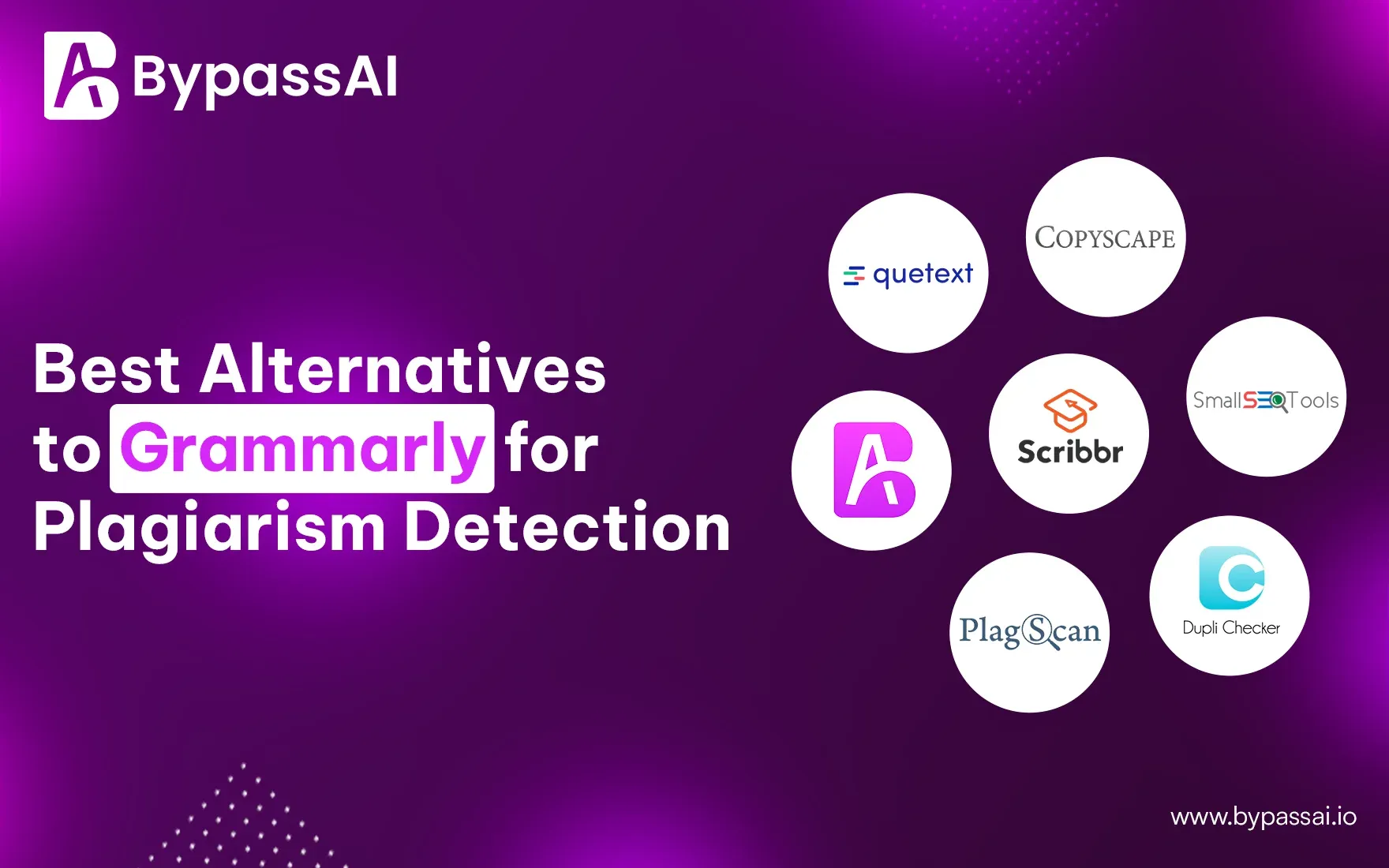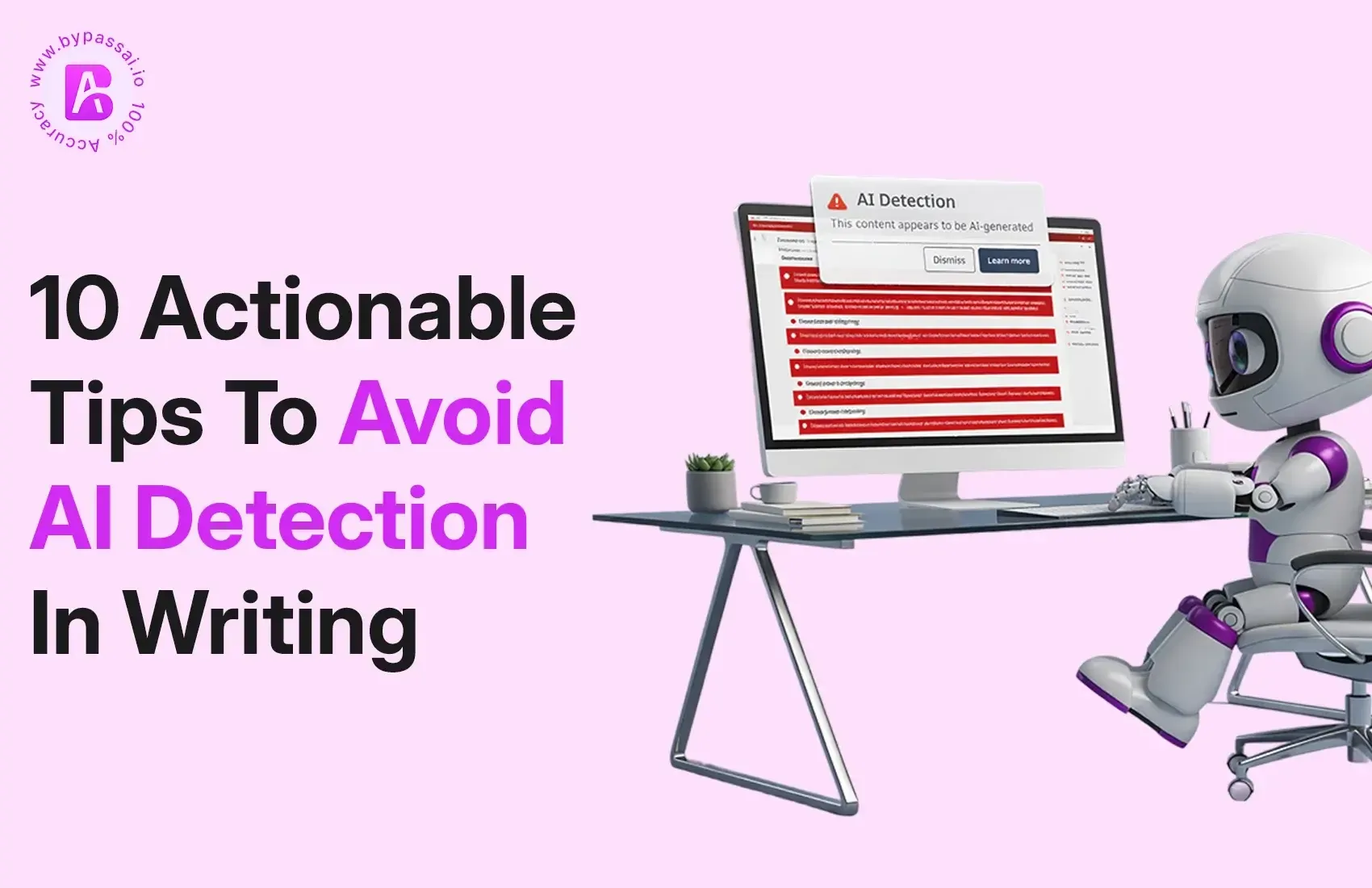Sign In
Welcome to Bypass AI! Sign in to continue your exploration of our platform with all its exciting features.
Forgot Password?
Don’t have an account ? Sign up
Sign Up
Embrace the Future with Bypass AI! Sign up now and let's rewrite the possibilities together.
You have an account ? Sign In
Enter OTP
We’ll send you an OTP on your registered email address
Back to Login
Forgot Password
We'll Send You An Email To Reset Your Password.
Back to Login
Enter OTP
We'll send you an email to reset your password.
Back to Login
Confirm Password
Please enter your new password.
TABLE OF CONTENTS
Quick Summary
What Is Grammarly’s Plagiarism Checker?
Why Grammarly Is So Effective
What to Look for in a Grammarly Plagiarism Alternative
Top Grammarly Plagiarism Checker Alternatives
Why Consider Alternatives to Grammarly’s Plagiarism Checker?
Conclusion
FAQs
In school writing, blogging, and professional content creation, plagiarism checking is the order of the day. Grammarly plagiarism checker is among the most popular, but not necessarily the best for everyone. For cost, fewer features, or specific academic requirements, the majority are now searching for the best Grammarly plagiarism checker substitute suitable for their use case.
Quick Summary
Grammarly provides good plagiarism detection as part of an all-in-one writing solution, but it may not be enough for everyone, particularly if you are looking for a check on your academic writing, a more budget-friendly solution, or a specialised checker that only looks at AI-generated content. Whether you're a student, content creator, or SEO/content professional, there are alternatives, like Scribbr, Quetext, or Copyscape, that might offer more focused, effective, cheaper, or more specialised plagiarism detection. Pick the right tool for your content type and needs.
What Is Grammarly’s Plagiarism Checker?
Grammarly's plagiarism checker, part of its Premium option, checks your writing against 16+ billion web pages and academic repositories. It identifies exact matches and includes links to the source. Perfect for hobbyist writers and bloggers, it makes sure your work is not inadvertently plagiarized from other web content. It lacks some capabilities that academic authors or researchers need, i.e., citation support, thorough reports of originality, and institutional access.
Why Grammarly Is So Effective
Grammarly stands out as it not only identifies plagiarism. It's an entire writing aid with:

Contextual Analysis: It detects likely plagiarized content even when wordings are somewhat changed.
Advanced Spelling and Grammar: Aids to make your writing even better in real-time.
Vocabulary Enrichment: Gives word options for tone and readability.
User-Friendly Interface: Compatible for use on browsers, Microsoft Word, and mobile apps.
While great for overall content creation, it's not necessarily ideal for academic standing or those on a budget.
What to Look for in a Grammarly Plagiarism Alternative
Selecting the right plagiarism checker is about more than just an attractive interface or household name. As a student, academic, blogger, or content marketer, a good alternative to Grammarly's plagiarism checker should combine a range of attributes, including depth of scan, price, and overall usability. Here is what you should look up.What to Look for in a Grammarly Plagiarism Alternative
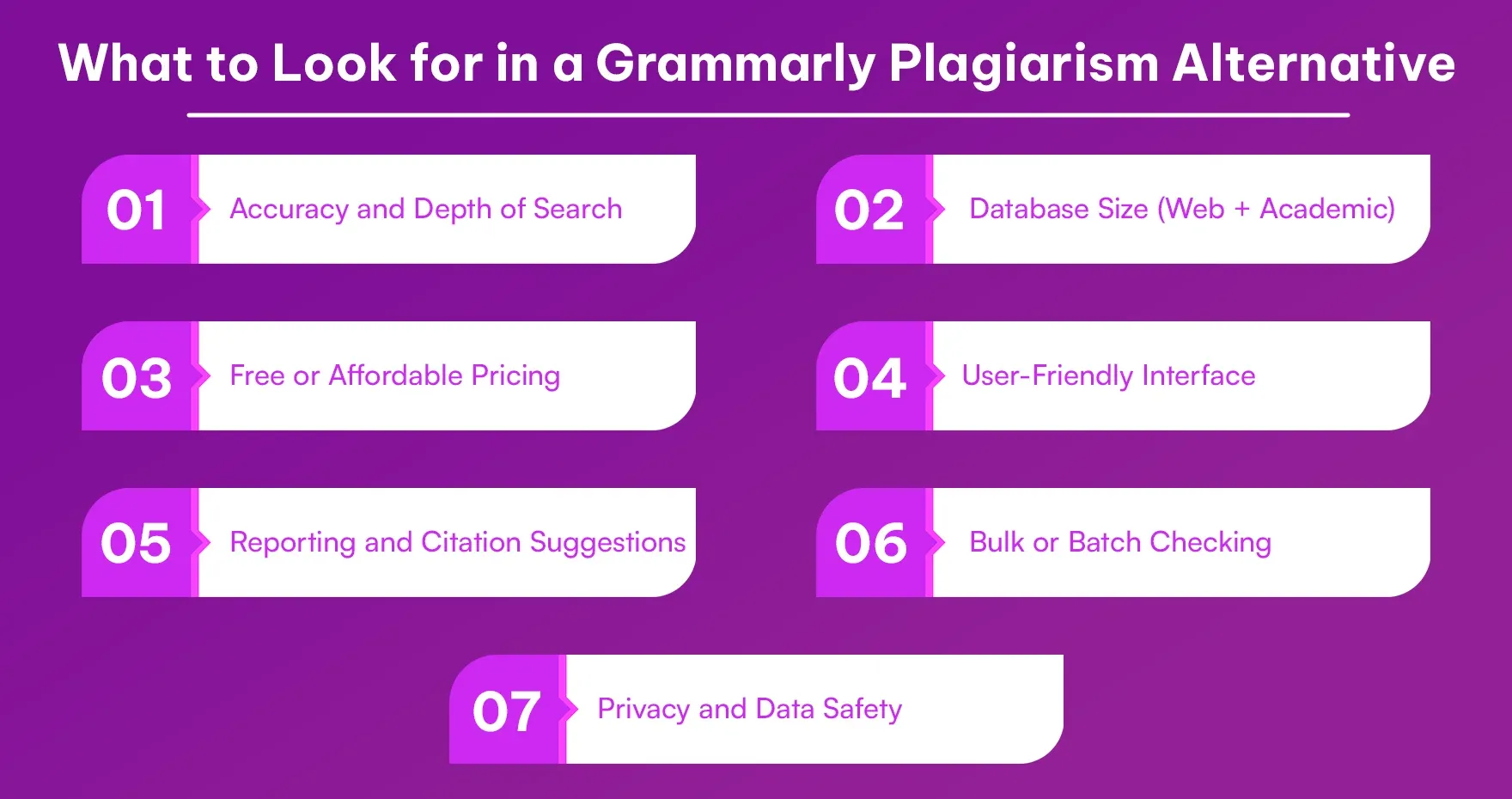
1. Accuracy and Depth of Search
A quality plagiarism checker should be able to do more than find a match-it should find paraphrased, rewritten, and even AI-generated content. Tools like Quetext (DeepSearch) and Scribbr (via Turnitin) are top performers at finding implied similarities in a way that basic scanners won't recognize.
2. Database Size (Web + Academic)
A wider database is better. Grammarly might scan over 16 billion webpages, but it lacks the depth of academia. Tools like Scribbr are the best when it comes to academic writing, since they pull from scholarly journals, research articles, and institutional repositories-exactly what a student or researcher will need.
3. Free or Affordable Pricing
Grammarly's plagiarism checker is only available with a premium plan. However, if you're looking for a more budget-friendly option, tools like Duplichecker and SmallSEOTools sometimes offer free scans. These free scans typically come with limitations. Quetext is also a pretty decent free option with low-priced Pro options, making it an acceptable halfway point.
4. User-Friendly Interface
Clunky tools can impede even the best writers. Use plagiarism checkers that are easy to navigate, with clear instructions and instant results. Copyscape and Quetext are great tools that accommodate beginner to advanced users with easy-to-use interfaces.
5. Reporting and Citation Suggestions
With academic writing, these tools don't necessarily just show that something is copied content; they tell you how to fix it (assuming it is appropriately done). The best have an originality report with links to sources and even suggested corrections for citations in APA, MLA or Chicago, etc.
6. Bulk or Batch Checking
If you have many documents to check in one go (like if you are checking a batch of student essays or blog articles), being able to quickly and easily do this (rather than washing and checking each one) can be tiring. Look for packages that let you batch up documents or scan a bigger file.
7. Privacy and Data Safety
There are potential risks with uploading sensitive or proprietary content. Always select tools that clearly communicate how they use user data and information. For example, tools with GDPR compliance or ISO compliance, like Plagscan, will assure users that the data is safe from an academic/institutional level.
Alsor read this article : Review of Grammarly Plagiarism Checker
Top Grammarly Plagiarism Checker Alternatives
The following are the top alternatives to Grammarly Plagiarism Checker:
1. Bypass.IO Plagiarism Checker
Bypass AI designed for detecting AI-generated content, especially AI-paraphrased text, Bypass.IO is a new tool rapidly gaining acceptance among the fraternity of digital content writers using AI-assistive software. While detection proves useful to further circumvent AI detectors, the tool cannot be used along academic lines, as it would not allow access to academic databases. Because a limited number of users have tried it, it has fewer reviews and, consequently, less community trust-for now. However, the product is also rising along the road to addressing AI-specific content concerns.
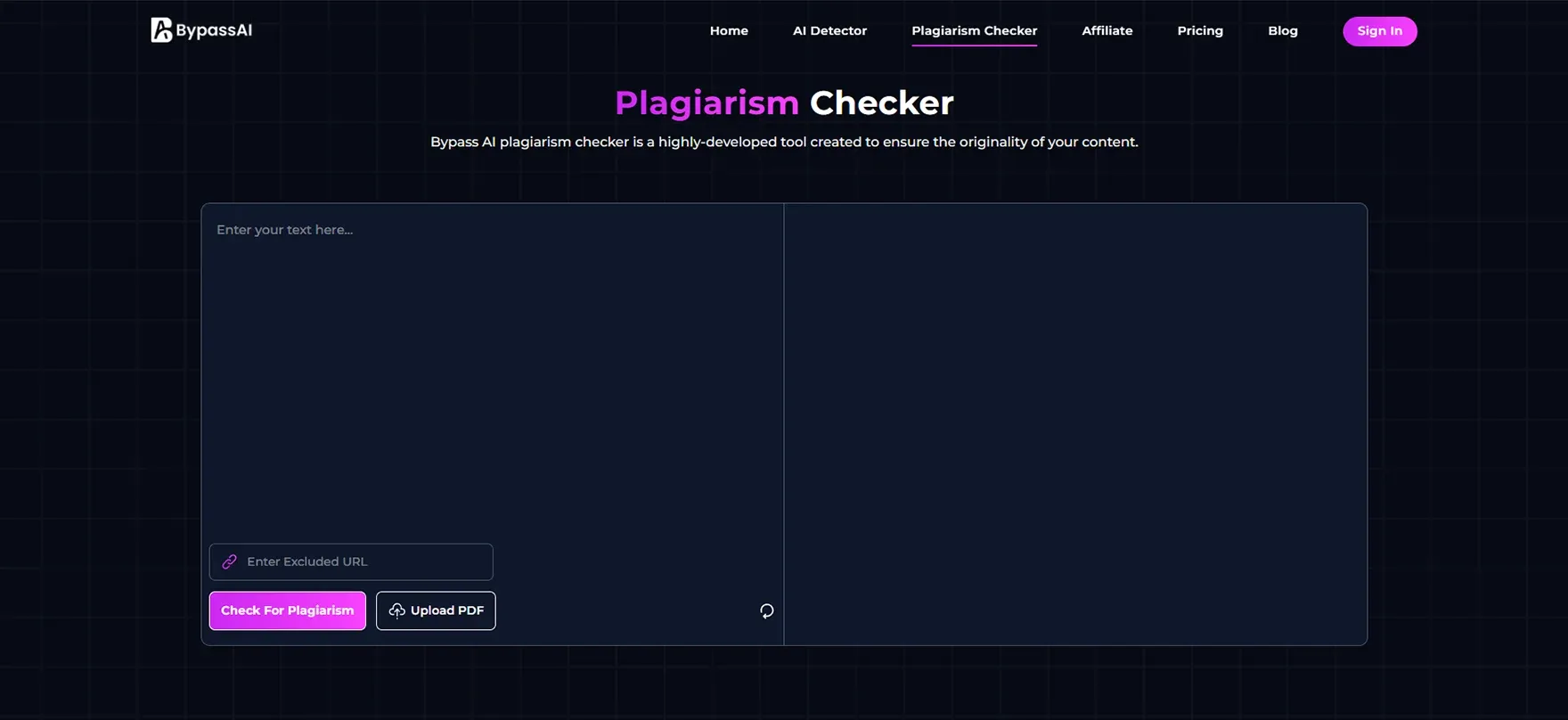
Pros
- Made to detect paraphrased and AI content.
- Beneficial for content writers who use AI software.
Cons
- Limited ability for academic checking.
- Newer instrument with a limited user base.
2. Quetext
Quetext most probably remains a favourite tool for plagiarism check services in regards to text paraphrased or AI-written and is therefore really useful to bloggers, marketers, and freelance writers. The tool uses DeepSearch™ technology to catch more disguised types of content mutilation or text spinning. However, a user needs to sign up for the Pro version of the sit,e starting at $9.99 per month, to access the full list of features, including unlimited checks and citation tools. Quetext will check web content, but when it comes down to checking for academic journals or databases, it gets quite sketchy, hence bearing less weight for researchers and technical writers.
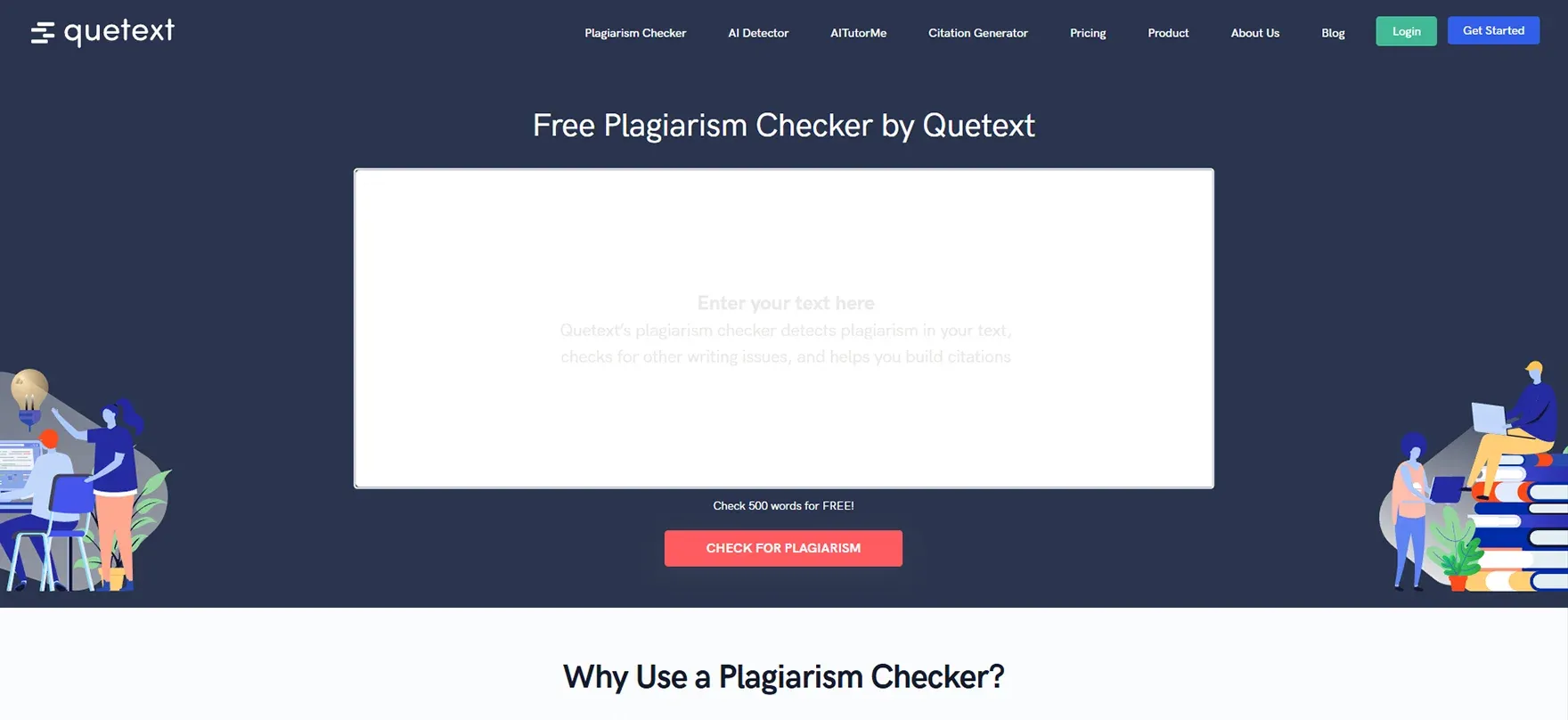
Pros
- Designed to identify paraphrased and AI-written content.
- Beneficial for content developers using AI software.
Cons
- The Pro version (starts at $9.99/month) is required for full features
- Not as comprehensive for scientific databases
3. Copyscape
Over the years, Copyscape has remained a favourite amongst bloggers, SEO professionals, and web content creators. It truly shines in the identification of duplicate content pertinent to the draft of the patent concept and the authorization of the writers in case of accidental plagiarism. The interface is clean and decent. Pricing is on a pay-as-you-go basis. Since it doesn't provide for academic integrity suggestions, citation suggestions, or checks from scholarly sources, it lacks in that area. Also, there is no free plan and no support for checking internal duplicates within offline documents; it is more suited to published web content than it is for academic or unpublished work.
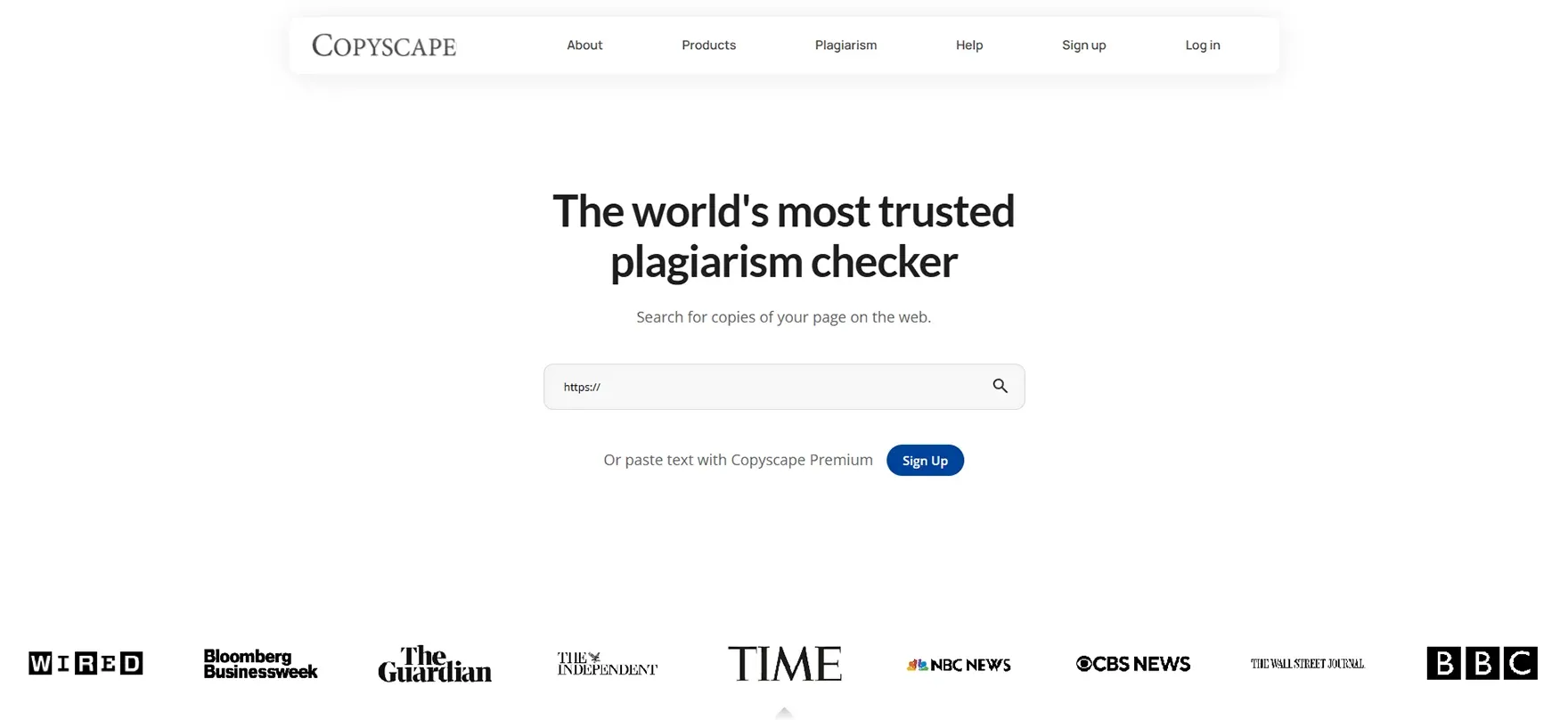
Pros
- Reliable in the online content market for years.
- Perfect to look for duplicate or scraped web content.
Cons
- Does not have academic or citation tools.
- Pay-as-you-go pricing with no free plan.
4. Scribbr
Mostly suited for plagiarism checking for students and academic professionals who require more thorough plagiarism analysis, the Scribbr Plagiarism Checker is highly effective on theses, research papers, and scholarly articles due to its access to the mighty Turnitin database. It also furnishes sources for assistance with citing the content, along with comprehensibly translated originality reports that help one better their work. However, usage is billed, with the price being dependent on word count. The generation of reports sometimes takes quite a few minutes, which is enough to make it a preferable selection in academic domains, owing to the depth and accuracy.
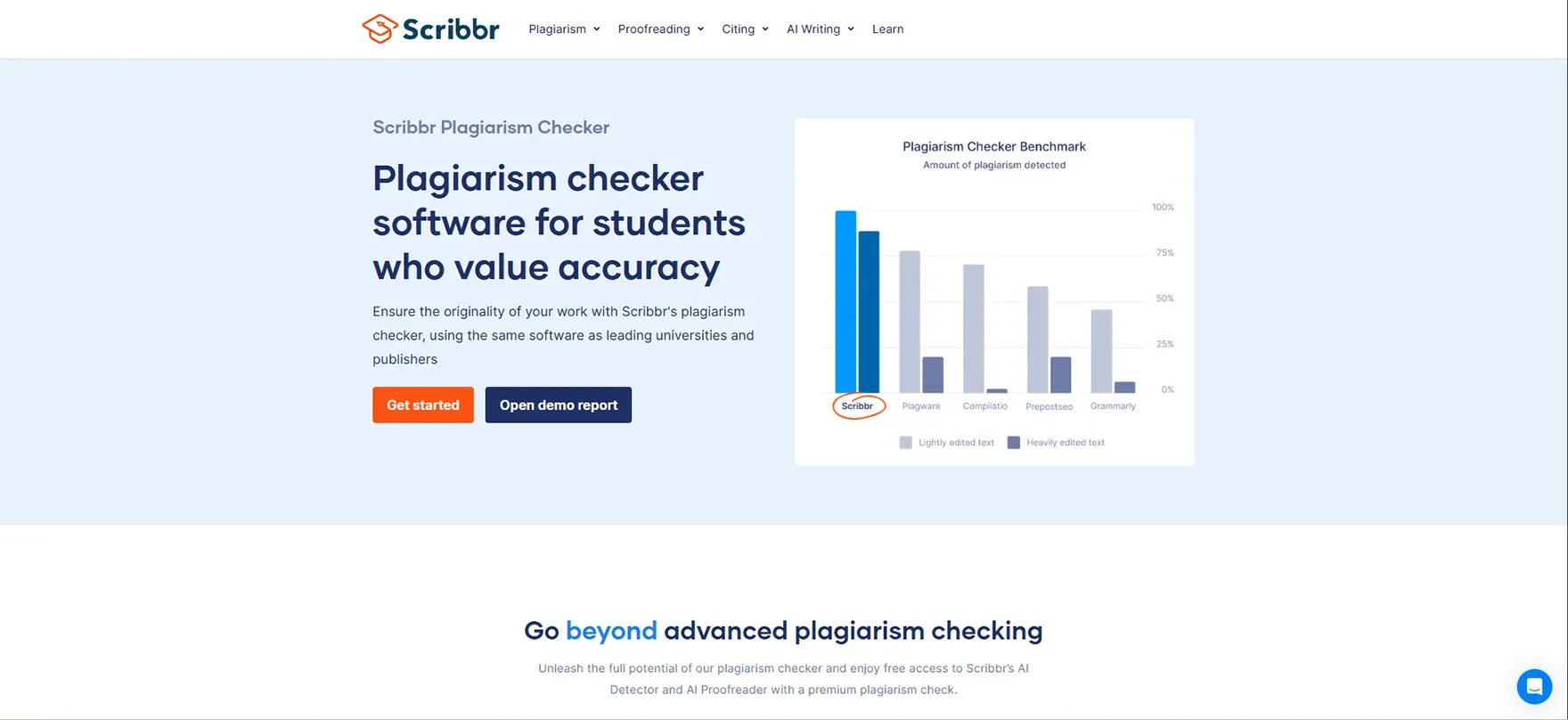
Pros
- Very accurate because it has Turnitin database integration.
- Provides suggestions for citation and in-depth originality reports.
Cons
- Paid access only (word count-based pricing).
- Reports take a few minutes to generate.
5. Plagscan
Plagscan serves institutions and professionals requiring rigorous document scanning. It allows for multiple file types and offers plagiarism checking attuned to academic integrity, ISO-certified. Hence, users can upload DOCX, PDF, TXT, etc., and receive detailed reports with potential sources. Though reliable and effective, the interface looks outdated, thus undermining ease of use. Limited features are accessible only in the free version, so a paid subscription is the only way for educational institutions or professionals to truly benefit from it.
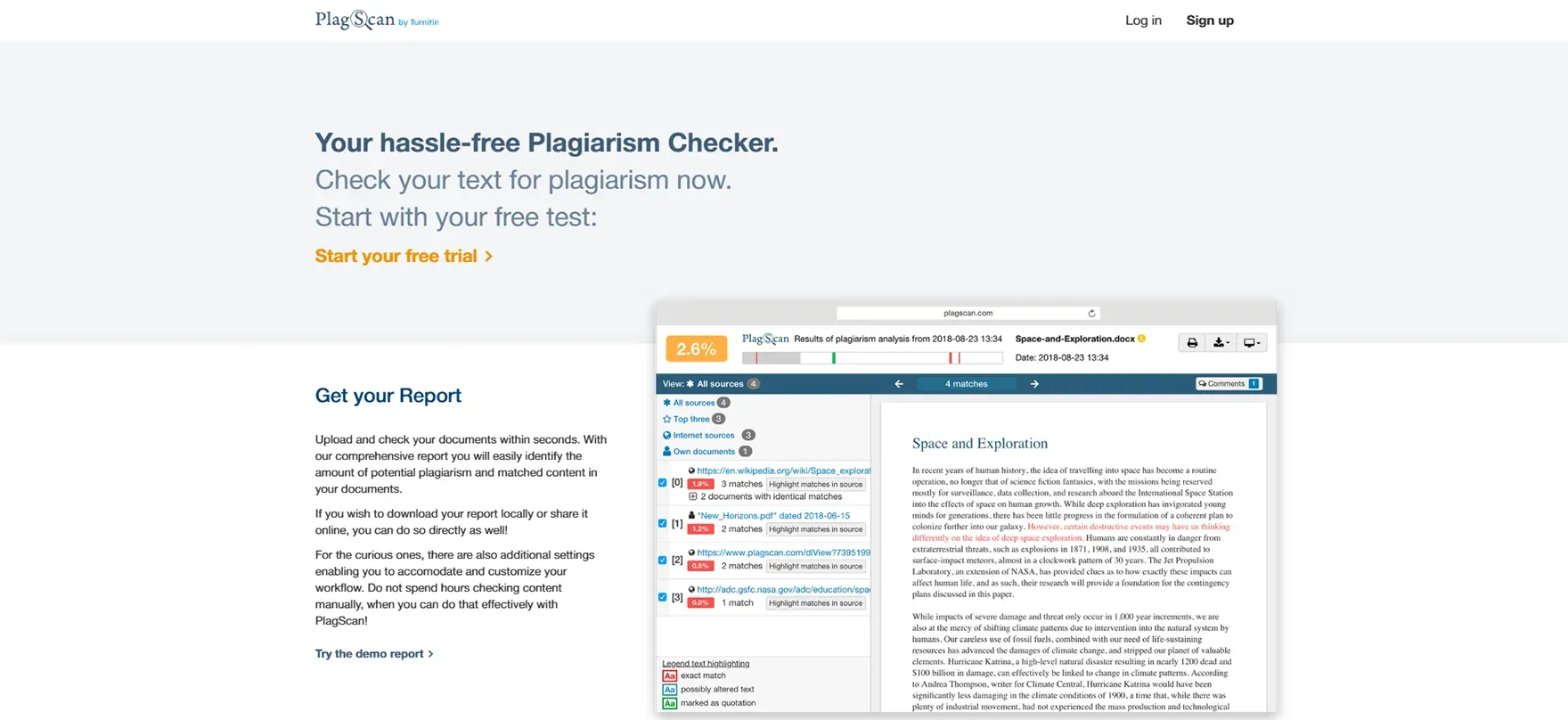
Pros
- ISO-certified for academic honesty.
- Supports multiple file types such as DOCX, PDF, and TXT.
Cons
- Slightly old-fashioned interface.
- The free plan has limited pages.
6. Duplichecker
Duplichecker is the easy way to carry out quick and casual checks without registering. It is an essential tool for the common man to detect straightforward plagiarism with ease and without charging a dime. The site also boasts features such as grammar checking, paraphrasing, and other SEO-related tools. However, there is a downside to using this system: the 1,000-word scan limit. It is really not the finest product to sift through academic or hard paraphrased content. If quick and versatile, one could use it for the general type of web content, but not for the really high-stakes things or academics.
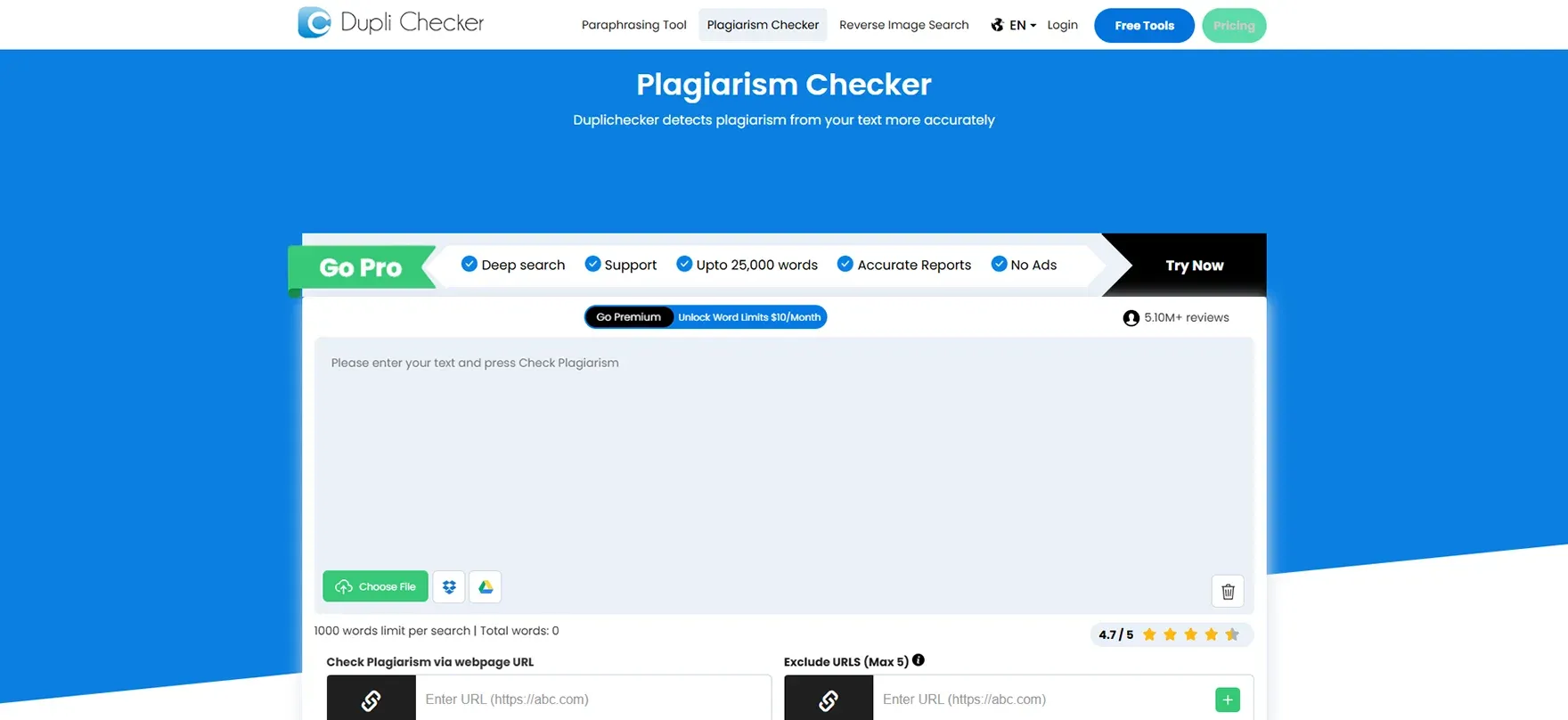
Pros
- Free for brief messages.
- Other tools (grammar, SEO, paraphrasing) included.
Cons
- 1,000-word limit for a scan.
- Not as precise for academic or paraphrasing detection.
7. SmallSEOTools
SmallSEOTools hosts a completely free plagiarism checker and ranks among the top choices for freelancers, students, and bloggers working on tight budgets. It supports multiple languages and handles long-form content advantage by all means. Advert-laden is the platform; hence, it is rarely precise in the offered results, especially when tackling complicated or paraphrased texts. The platform stands as a popular beginner-level option for quick checks and comes wrapped with diverse writing and SEO tools.
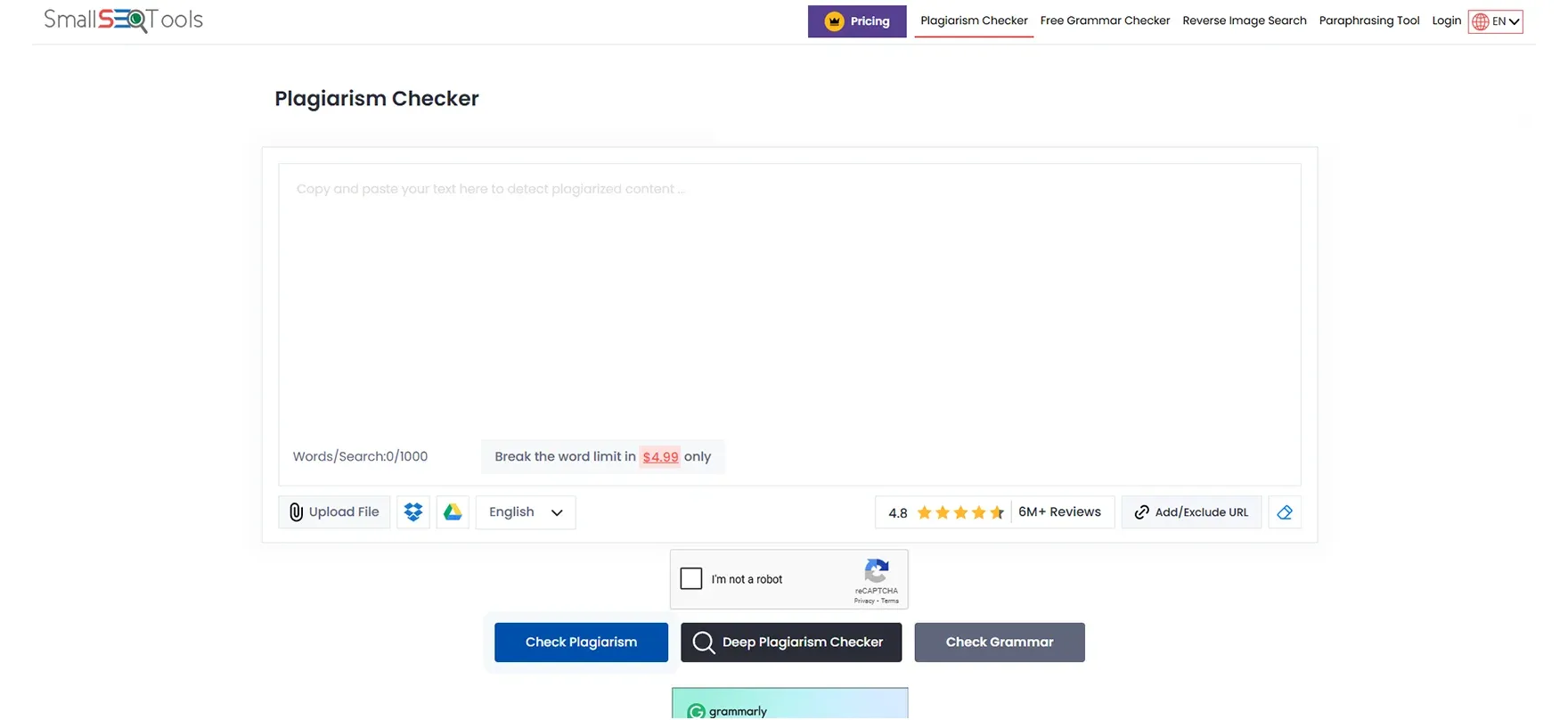
Pros
- Completely free, even for more extensive texts.
- Multilingual content-friendly.
Cons
- Advertisements and messy page design.
- Results are not always precise or complete.
Why Consider Alternatives to Grammarly’s Plagiarism Checker?
While Grammarly is popular and convenient, alternatives may be a better fit if:
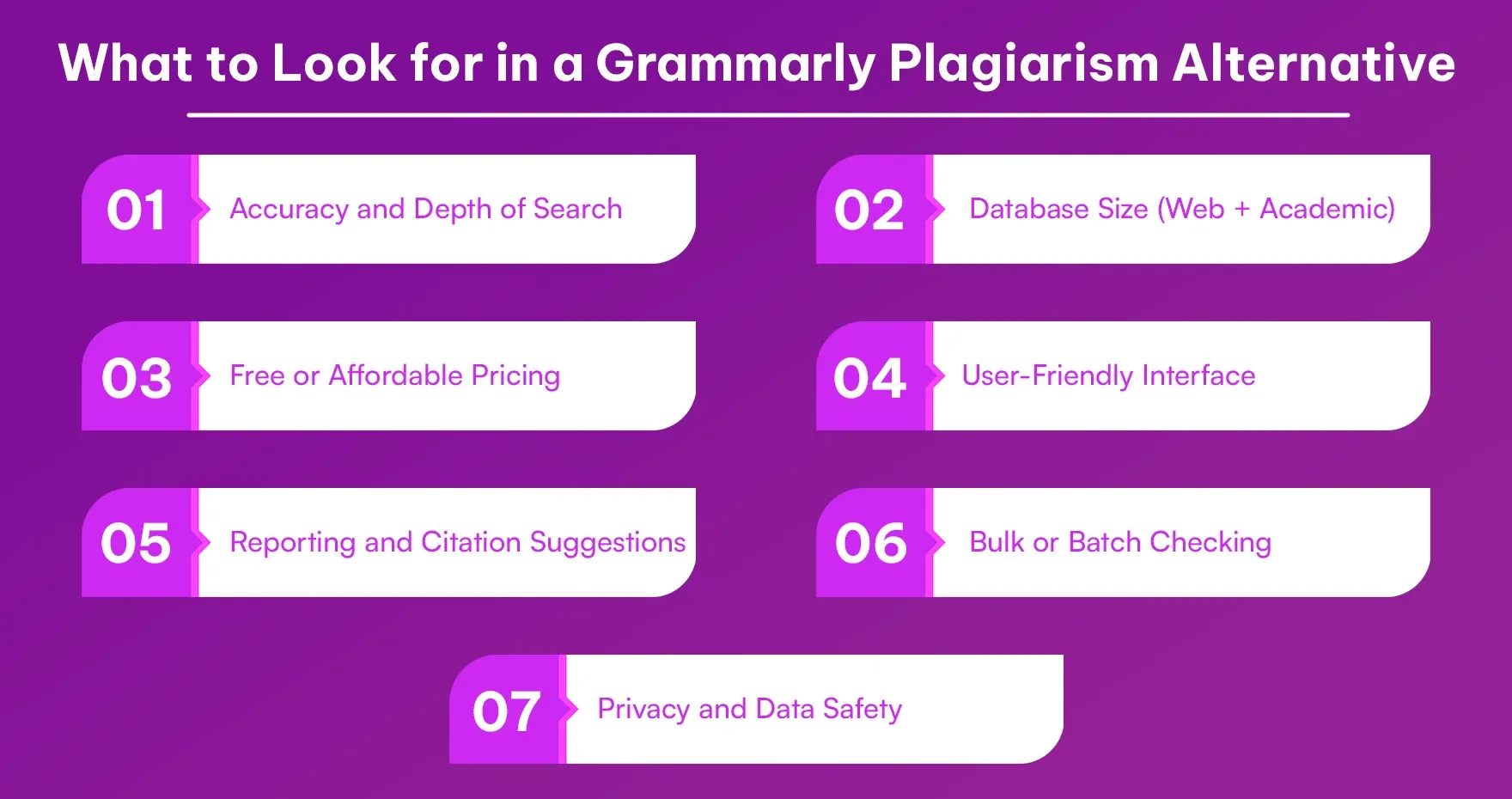
- You’re a student needing academic-specific reports and citation tools.
- You need a free option for quick scans.
- You require batch uploads or scanning of multiple documents.0
- You work with AI-generated content or need tools that can detect rephrasing.
- Grammarly’s Premium pricing isn’t justifiable for your needs.
Conclusion
Grammarly is a pretty decent grammar correcting and writing enhancement tool in itself, but it offered plagiarism features with an additional Premium account, which still might be far from adequate for some, especially students or the cost-conscious buyers. Well, you do have at least a couple of very competent alternatives to Grammarly's plagiarism checker that compensate largely for its lack of effectiveness in some areas, enriched with features such as full academic checks, no usage limits, multilingual support, and more wallet-friendly pricing.
Academic research stands out because of access to databases and proper citations offered by Scribbr. Quetext and Bypass AI meanwhile, goes the other way and provides deep detection using DeepSearch technology. Then there's Copyscape, another tool great for bloggers or SEO experts. Duplichecker and SmallSEOTools also remain free and relatively straightforward for casual and sensitive users, even if their detections can be suspect sometimes.
FAQs
1. Can I get Grammarly's plagiarism checker for free?
No, Grammarly's plagiarism checker only comes with a Premium account. Grammar and spelling-checking functionalities come for free, but the plagiarism detector doesn't.
2. What is the best Grammarly alternative for students?
Scribbr is the best student alternative. It has sophisticated academic-level plagiarism checks against Turnitin's database and generates comprehensive originality reports together with citation suggestions.
3. Can I use a plagiarism detector without registering for an account?
Yes. Websites like Duplichecker and SmallSEOTools allow you to check plagiarism in content without registering or logging in.
4. Would Copyscape be a viable choice for writing academically?
Not especially. Copyscape is geared towards finding similar online content duplications in websites, blogs, and SEO work. It won't scan through academic journals or student database
5. Can I use free Grammarly alternatives for detecting plagiarism?
Yes. Quetext (free plan), Duplichecker, and SmallSEOTools provide free plagiarism checks, although they may have word counts or fewer functions than premium services.

